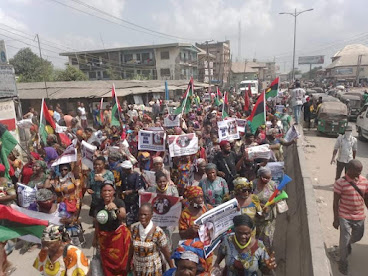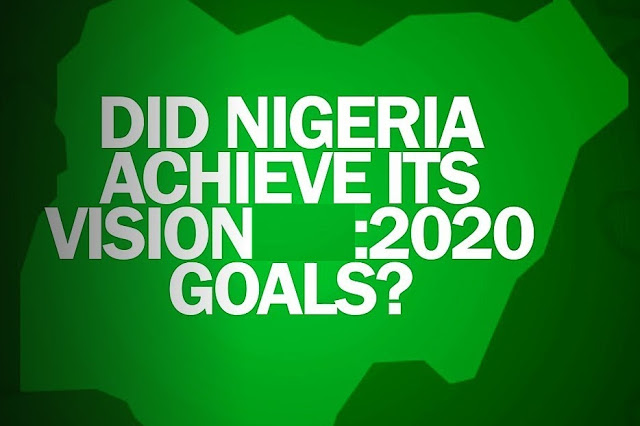Thursday, 8 August 2024
Self-Determination: Northern Protesters Should Demand For Referendum Not Military Takeover To End Bad Governance
23:11:00 - 0 Comments
Monday, 12 June 2023
IPOB PRESS RELEASE: IPOB WORLDWIDE REJECT ANY SURGERY ON OUR LEADER INSIDE DSS DUNGEON.
02:49:00 - 0 Comments
IPOB PRESS RELEASE: IPOB WORLDWIDE REJECT ANY SURGERY ON OUR LEADER INSIDE DSS DUNGEON.
Friday, 24 March 2023
How The Global Press Describes Nigerian Elections And Elected President
11:46:00 - 0 Comments
How The Global Press Describes Nigerian Elections And Elected President
Saturday, 17 December 2022
Women Across Three Biafran States Stormed The Streets, Demands The Unconditional Release Of Mazi Nnamdi Kanu, Calls For A Referendum Date
02:25:00 - 0 Comments
Women Across Three Biafran States Stormed The Streets, Demands The Unconditional Release Of Mazi Nnamdi Kanu, Calls For A Referendum Date
Tuesday, 22 November 2022
Nnamdi Kanu demands N20bn compensation, apologies from Malami for saying he "jumped bail" despite Court clearance
05:02:00 - 0 Comments
Nnamdi Kanu demands N20bn compensation, apologies from Malami for saying he "jumped bail" despite Court clearance
Thursday, 17 November 2022
We Have No Hand In The Murder Of Eze Obudi Agwa In Oguta Lga Imo State - IPOB
14:55:00 - 0 Comments
We Have No Hand In The Murder Of Eze Obudi Agwa In Oguta Lga Imo State - IPOB
Thursday, 29 September 2022
Vision 2020-20 and the Hopelessness of the Nigerian State
19:59:00 - 0 Comments
Vision 2020-20 and the Hopelessness of the Nigerian State
Monday, 6 January 2020
PEOPLE'S VIEWS ABOUT THE COUNTRY CALLED NIGERIA (PART 2)
04:50:00 - 0 Comments
PEOPLE'S VIEWS ABOUT THE COUNTRY CALLED NIGERIA (PART 2)
It may be surprising to hear the Sarduana of Sokoto, Sir Ahmadu Bello, whom Nigerians refer to as one of the founding fathers, to be quoted to have said that: "The mistake of 1914 has come to the fore". Since 1914, the British Government ...
Saturday, 4 January 2020
Iran vs USA: Eyes on Africa as Iran looks to hit US interests
16:07:00 - 0 Comments
Iran vs USA: Eyes on Africa as Iran looks to hit US interests
January 05, 2020 | The Biafra Times
WASHINGTON - Africa could emerge as a venue ...
Sunday, 22 December 2019
West Africa: The Risk of Jihadist Contagion in West Africa
21:55:00 - 0 Comments
West Africa: The Risk of Jihadist Contagion in West Africa
By International Crisis Group
Faced with jihadist breakthrough in Burkina Faso, neighbouring states in West Africa's Gulf of Guinea increasingly fear attacks in their own territories. These countries should improve intelligence sharing, strengthen border ...
Monday, 7 October 2019
Nigeria truly the troubled giant of Africa says Campbell
21:30:00 - 0 Comments
Nigeria truly the troubled giant of Africa says Campbell
October 8, 2018 | The Biafra Times
A former US Ambassador to Nigeria, Mr. John Campbell, has said though Nigeria possesses extraordinary potential, it is the truly troubled giant of Africa.
Campbell stated this in a new book he co-authored ...
Monday, 14 January 2019
IPOB: How Biafra Government system will be
09:31:00 - 2 Comments
IPOB: How Biafra Government system will be
January 14, 2019
THIS IS FOR THOSE OF US WHO DO NOT KNOW HOW BIAFRA SYSTEM OF GOVERNMENT WILL BE LIKE:
During the interactive session with our leader, Mazi Nnamdi Kanu, on 12th January, 2019, OWEI KEME BRADIKUMO asked a question:
1) What i ...


.jpeg)
.jpg)
.jpeg)






.jpg)

.jpeg)

.jpeg)

























Sosial Buttons
Contact Form